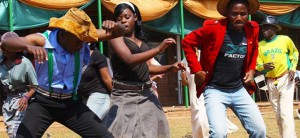 Teachers are upset because pupils with isiNdebele as their mother tongue were expected to answer questions in Shona. It is being claimed that Shona speaking participants were advantaged as Shona is their home language whereas pupils from Bulawayo may not have understood the language.
Teachers are upset because pupils with isiNdebele as their mother tongue were expected to answer questions in Shona. It is being claimed that Shona speaking participants were advantaged as Shona is their home language whereas pupils from Bulawayo may not have understood the language.
This incident has left scores of participants and teachers disgruntled as they view it as a deliberate plot to disadvantage them.
At the recent quiz an African musical instrument known as a mbira, was shown to contestants and then the following question, that caused all the controversy was asked: “This instrument is called a mbira. From which Shona word does the word mbira derive?â€
“We are deeply hurt by those who set the quiz questions. This is pure tribalism and segregation designed to disadvantage us. If they meant to promote indigenous languages they should have included isiNdebele. What they did is unacceptable,†said a female teacher from Bulawayo who claimed anonymity, for fear of possible victimisation.
One hundred students and sixty teachers from Matabeleland allegedly felt disadvantaged and complained about this incident.
This reporter was told that it was even more disappointing that questions set by the National Museums and Monuments and with the blessing of it’s senior education official, James Nemerai would cause such controversy as the organisation claims to promote national culture and the use of national, indigenous languages.
“If their definition of national culture means the promotion of one language over another then they need to go back to the drawing board. We must always bear in mind that the home language or mother tongue remains at the centre of development. The fact that our primary school children were subjected to this type of tribalism proves that we are in a crisis,†said another disgruntled teacher.
Tribalism is gradually taking centre stage in more spheres of life. What comes to mind is the issue of the controversial 2013 Grade seven isiNdebele examination paper that was condemned and debated in the National Assembly in 2014 by MP’s who demanded an overhaul of the Zimbabwe School Examinations Council (Zimsec).
The grade seven isiNdebele paper apparently contained, what language experts called, ‘acid quoted words’ that lead to teachers and veteran educationalists from the region questioning the quality and standard of the paper.
In a petition to ZIMSE Director, Esau Shingirai Nhandara, the Ndebele community put it that it was culturally unaccepted to put words such as ‘umangumba, ikhikhitha, isifebe and ukusuza in a grade seven paper.
Last year, use of isiNdebele was ‘banned’ in parliament. MP’s from Matabeleland protested the ban saying it was unacceptable for Ministers to claim that they are not conversant with isiNdebele which is one of the country’s official languages. On several occasions national assembly members and senators who speak isiNdebele are asked to make their contributions in English and they have since complained that this is unfair as their Shona speaking counterparts were free to use their mother language.
In an interview with this journalist, the regional director of the National Museums and Monuments, Nobert Nhutsve confirmed that he had noted the problem experienced with the quiz question and that mechanisms will be put in place to stop similar problems happening in the future.
Post published in: Arts

